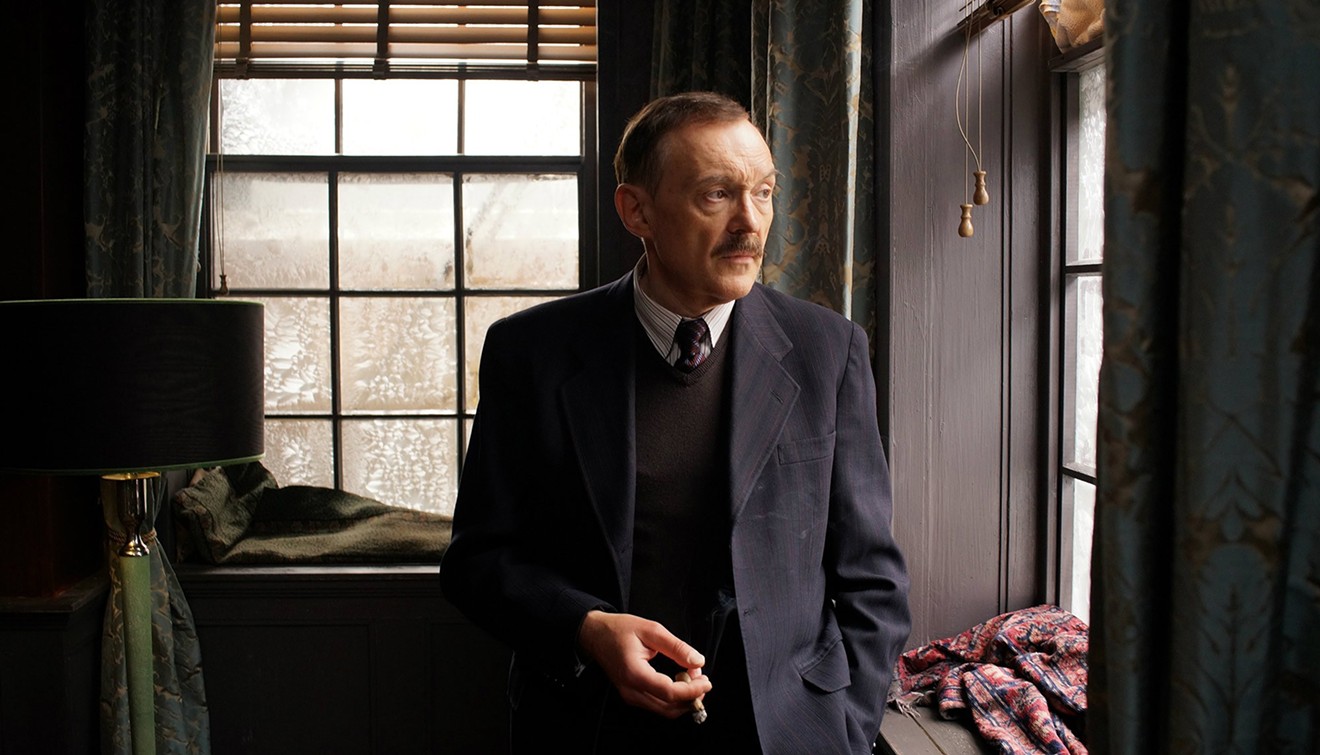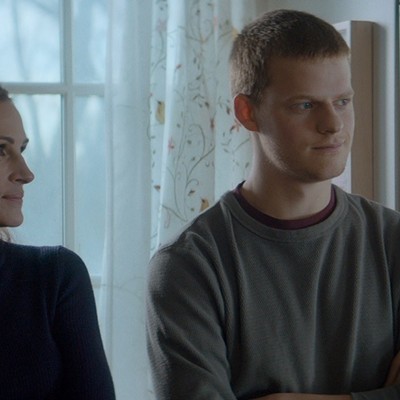Maria Schrader’s excellent dramatic feature chronicles Stefan Zweig’s final years in exile. Born in Vienna to an upper-middle-class family in 1881, Zweig had become one of the most popular writers in the world by the 1920s. He was a passionate humanist, fervently dedicated to a peaceful pan-Europeanism. Following World War I, his villa on the Alps, near Salzburg, became a cultural mecca for European artists, with H.G. Wells, Thomas Mann, James Joyce, Richard Strauss and Béla Bartók frequent visitors. From the terrace, they could see across the border into southern Germany. In his memoir, The World of Yesterday, he writes, “We spent so many happy hours with all our guests, sitting on the terrace and looking out at the beautiful and peaceful landscape, never guessing that directly opposite, on the mountain in Berchtesgaden, a man lived who would destroy it all.”
Zweig’s lodge represented everything that Hitler was determined to annihilate, and not just because the landlord was Jewish: It was the cosmopolitan, egalitarian, democratic European ideal the Nazis detested. By 1934, less than a year after Hitler’s rise to power and four years before the Anschluss, Zweig fled, first to England and then to Brazil, where he and his second wife, Lotte, took their own lives in 1942.
Written by Schrader and Jan Schomburg and divided into six chapters, the film charts Zweig’s gradual sinking into despair at the rise of European fascism and the ensuing war. The delineation between episodes suggests a collection of monographs, which is intentional and apt, considering that the author’s greatest expression of his talents came in his historical treatises. In these, Zweig draws portraits of major figures of Western civilization, but also finds parallels between them and his own time.
Schrader’s movie has similar intentions, giving historical context for the recent rise and increased legitimacy of far-right politics in the continent. What exemplifies Schrader’s approach, though, is his refusal to preach to a liberal choir. In an international writers’ congress in 1936, Zweig is hounded by questions about Nazi Germany, which he refuses to condemn; he would never speak out against a country, he says. Prodded further, he admits his reasoning for eschewing polemics: Being so far from the horrors of Germany, he is in no immediate danger. “Every gesture of resistance, which is void of either risk or impact, is nothing but a cry for recognition,” he says.
Especially for modern progressive audiences, this equivocal pacifism might seem at best naïve and at worst timid and self-centered. So whoever plays the role faces two challenges: Honor a singular author, and display his inner conflict in a way that doesn’t seem forced. Austrian Josef Hader succeeds at both, showing Zweig as a man unraveling under the weight of history, aware of his home continent’s nearing apocalypse. Aenne Schwarz and Barbara Sukowa give strong performances as the author’s second and first wives, respectively, but this is Hader’s movie. His is one of the great performances of recent years.
Schrader shows a technical assurance too often lacking in modern cinema. Her refusal to cut from a number of wide shots or to edit on-camera allows the film a crucial verisimilitude. Our eyes can’t help but follow Zweig across the frame as an entire reality plays out around him.
This is an empathetic film but one not wholly sympathetic to Zweig. It is tragically ironic that Zweig the cosmopolitan found it impossible to accept cosmopolitanism when it was thrust upon him. In his exile, he wrote of the “wretched feeling of being a foreigner,” positing that, in a foreign land, self-respect tends to diminish. In the film’s funniest and most poignant scene, an obsequious yet inconsiderate mayor of an Amazonian town organizes an ill-attended soirée in Zweig’s honor. During his remarks, the mayor offers his hope that the Zweigs return home soon, repeating a Brazilian proverb: “He who has no country shall have no future.” Zweig’s reserved stoicism shows its first crack, the author almost breaking down as a brass band badly plays “The Blue Danube,” a musical memory from a home that’s now gone.
Support Us
Houston's independent source of
local news and culture
account
- Welcome,
Insider - Login
- My Account
- My Newsletters
- Contribute
- Contact Us
- Sign out
Maria Schrader’s Stefan Zweig Film Is History Worthy of the Author Himself
Ali Arikan May 15, 2017 1:00PM

Josef Hader as Stefan Zweig.
First Run Features
[
{
"name": "Related Stories / Support Us Combo",
"component": "11591218",
"insertPoint": "4",
"requiredCountToDisplay": "4"
},{
"name": "Air - Billboard - Inline Content",
"component": "11591214",
"insertPoint": "2/3",
"requiredCountToDisplay": "7"
},{
"name": "R1 - Beta - Mobile Only",
"component": "12287027",
"insertPoint": "8",
"requiredCountToDisplay": "8"
},{
"name": "Air - MediumRectangle - Inline Content - Mobile Display Size 2",
"component": "11591215",
"insertPoint": "12",
"requiredCountToDisplay": "12"
},{
"name": "Air - MediumRectangle - Inline Content - Mobile Display Size 2",
"component": "11591215",
"insertPoint": "4th",
"startingPoint": "16",
"requiredCountToDisplay": "12"
}
,{
"name": "RevContent - In Article",
"component": "12527128",
"insertPoint": "3/5",
"requiredCountToDisplay": "5"
}
]
KEEP THE HOUSTON PRESS FREE...
Since we started the Houston Press, it has been defined as the free, independent voice of Houston, and we'd like to keep it that way. With local media under siege, it's more important than ever for us to rally support behind funding our local journalism. You can help by participating in our "I Support" program, allowing us to keep offering readers access to our incisive coverage of local news, food and culture with no paywalls.
Trending Film
- International Film Festival 2000
- It’s Sadly Kind of Perfect That New Season of GLOW Is Stolen by Marc Maron
- The Mysteries of Antonioni’s Blow-Up, a Half Century on
-
Sponsored Content From: [%sponsoredBy%]
[%title%]

Don't Miss Out
SIGN UP for the latest
news, free stuff and more!
Become a member to support the independent voice of Houston
and help keep the future of the Houston Press FREE
Use of this website constitutes acceptance of our
terms of use,
our cookies policy, and our
privacy policy
The Houston Press may earn a portion of sales from products & services purchased through links on our site from our
affiliate partners.
©2024
Houston Press, LP. All rights reserved.




